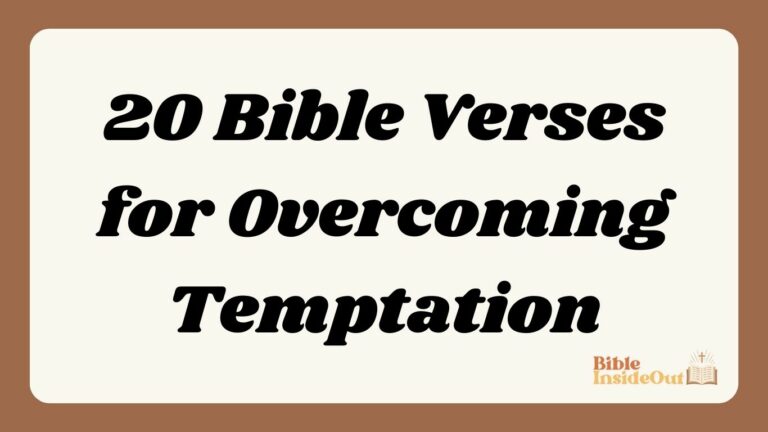25 Bible Verses About Repentance (With Commentary)
Embracing repentance is central to personal growth within various faith traditions, especially Christianity where it’s deeply interwoven with divine grace and mercy.
The Bible presents a profound narrative on repentance, encouraging individuals to confront their shortcomings and seek reconciliation with both God and community through heartfelt contrition.
Acknowledging Sin

1 John 1:9
"If we confess our sins, He is faithful and just and will forgive us our sins and purify us from all unrighteousness."
If we confess our sins, God is faithful. He will forgive us. Our sins are cleansed from us. It’s a promise in the Bible.
God’s forgiveness is certain for those who confess. This verse shows that acknowledging sin is key to receiving His grace.
Psalm 38:18
"I confess my iniquity; I am troubled by my sin."
David was aware of his transgressions. He was concerned about his sin always.
This psalm teaches us about the weight of unacknowledged sin. David sets an example by confronting his faults openly.
Proverbs 28:13
"Whoever conceals their sins does not prosper, but the one who confesses and renounces them finds mercy."
Hiding sins does not bring success, but confession and turning away from them earns mercy.
This proverb emphasizes honesty with oneself and God as essential steps toward repentance and forgiveness.
Luke 15:18
"I will set out and go back to my father and say to him: Father, I have sinned against heaven and against you."
The prodigal son decides to return home, admitting he sinned against heaven and before his father.
Jesus’ parable illustrates true repentance through action—returning home—and words, expressing regret for past mistakes.
Job 42:6
"Therefore I despise myself and repent in dust and ashes."
Job expresses remorse by despising himself in dust and ashes after recognizing his errors before God.
His response to divine revelation underscores a profound humility required for genuine repentance.
In Scripture, repentance involves more than feeling sorry—it means turning away from sin entirely and seeking to live according to God’s will. The Bible verses mentioned above provide guidance on how this process should unfold:
- Confession of one’s wrongdoings (1 John 1:9)
- Constant awareness of one’s sinful nature (Psalm 38:18)
- Not concealing but revealing one’s faults (Proverbs 28:13)
- Taking action towards making things right (Luke 15:18)
- Humbling oneself as part of repentance (Job 42:6)
These passages offer insight into experiencing the fullness of accepting forgiveness offered through the gospel. They show that truly facing our own wrongdoing—with its open shame—is crucial in moving forward with a clean slate. Moreover, these scriptures remind believers not to count slowness or delay.
Through these biblical examples, we learn that acknowledging sin isn’t merely an internal realization but also requires external expression—whether it be vocal confession or demonstrative return—to fully embrace the healing power of redemption offered by Christ Jesus.
The Call to Repent

Mark 1:15
"The time has come," he said. "The kingdom of God has come near. Repent and believe the good news!"
“The time is fulfilled, and the kingdom of God is at hand. Repent ye, and believe in the gospel.” These words mark a pivotal call for change. Jesus Christ begins His ministry with this powerful message. It’s not just about feeling regret or grief; it’s an active step towards transformation.
The verse from Mark emphasizes urgency. There’s no time to waste. This isn’t simply about avoiding judgment or anger; it’s about embracing a chance for rest and renewal that comes with turning back to God.
Acts 3:19
"Repent, then, and turn to God, so that your sins may be wiped out, that times of refreshing may come from the Lord."
“Repent ye therefore, and be converted, that your sins may be blotted out.” Here, the apostle Peter speaks after healing a lame man, using this miracle as proof of Jesus’ power and authority. He urges his listeners not only to repent but also to convert—to make a complete turnaround.
This passage from Acts shows us repentance involves more than saying sorry—it requires action that leads to spiritual refreshment. It’s like returning home after being lost.
Ezekiel 18:30
"Therefore, you Israelites, I will judge each of you according to your own ways, declares the Sovereign LORD. Repent! Turn away from all your offenses; then sin will not be your downfall."
“Therefore I will judge you… repent, and turn yourselves from all your transgressions; so iniquity shall not be your ruin.” Through Ezekiel, God issues both a warning against sin and an invitation for redemption—a chance to avoid destruction through sincere repentance.
Ezekiel presents an Old Testament perspective on repentance as turning away from wrongs rather than continuing down a path leading to death.
Matthew 4:17
"From that time on Jesus began to preach, 'Repent, for the kingdom of heaven has come near.'"
From then on Jesus began to preach, “Repent: for the kingdom of heaven is at hand.” Again we see Christ Himself urging people toward repentance as He starts His public ministry—highlighting its importance in receiving God’s kingdom.
Matthew underscores that true repentance must accompany our faith journey if we are seeking closeness with God.
Luke 13:3
"I tell you, no! But unless you repent, you too will all perish."
“I tell you… except ye repent, ye shall all likewise perish.” In Luke’s account, Jesus responds emphatically following news of tragedies by saying everyone needs repentance—not just tax collectors or those deemed ‘sinners.’
Luke reminds readers that everyone falls short without genuine remorse followed by real change.
God’s Mercy in Repentance

2 Peter 3:9
"The Lord is not slow in keeping his promise, as some understand slowness. Instead he is patient with you, not wanting anyone to perish, but everyone to come to repentance."
The Bible speaks often of God’s patience. In 2 Peter 3:9, it says that the Lord is not slow about His promise. He is patient with us, not wanting anyone to perish but everyone to come to repentance.
This verse highlights that repentance is central to God’s plan for humanity. It shows His desire for all people to turn away from sin and towards Him. The emphasis on patience reveals a God who gives individuals time to change their ways.
Joel 2:13
"Rend your heart and not your garments. Return to the LORD your God, for he is gracious and compassionate, slow to anger and abounding in love, and he relents from sending calamity."
Joel urges people to return to the Lord with all their heart. This passage emphasizes tearing your heart and not your garments as a sign of true repentance.
It teaches that external acts alone aren’t enough; inner change is what counts. Godly grief leads us closer to forgiveness and demonstrates the depth of God’s mercy when we seek Him sincerely.
Romans 2:4
"Or do you show contempt for the riches of his kindness, forbearance and patience, not realizing that God's kindness is intended to lead you to repentance?"
In Romans, Paul talks about how kindness leads you toward repentance. This scripture points out that it’s not fear, but the goodness of God that brings us back into right relationship with Him.
Here, kindness isn’t just an attribute—it’s a transformative force meant for our benefit and growth as believers. It serves as a reminder why we should never take His grace for granted.
1 Timothy 1:15-16
"Here is a trustworthy saying that deserves full acceptance: Christ Jesus came into the world to save sinners—of whom I am the worst. But for that very reason I was shown mercy so that in me, the worst of sinners, Christ Jesus might display his immense patience as an example for those who would believe in him and receive eternal life."
Paul refers himself as an example of Christ Jesus’ perfect patience in these verses from Timothy. He was shown mercy so he could be an example for those who would believe in Christ later on.
These words give hope by showing no one is beyond redemption if they truly embrace faith and penitence through Jesus’ sacrifice on the cross—highlighting once more the boundless scope of divine pardon available through sincere repentance.
Nehemiah 1:9
"But if you return to me and obey my commands, then even if your exiled people are at the farthest horizon, I will gather them from there and bring them to the place I have chosen as a dwelling for my Name."
Nehemiah recalls God’s promise—if his scattered people return and obey his commands, even from distant lands, they will be gathered again because His dwelling place will always be among them.
This Old Testament reference reinforces commitment alongside mercy; obedience draws us nearer while disobedience separates us from divine presence—the choice rests within each person’s actions aligned with holy intent.
Turning Away from Sin

Acts 26:20
"First to those in Damascus, then to those in Jerusalem and in all Judea, and then to the Gentiles, I preached that they should repent and turn to God and demonstrate their repentance by their deeds."
Paul’s message to both Jews and Gentiles emphasized repentance. He urged people to turn from their sins and demonstrate their change with deeds. This approach shows that true repentance isn’t just feeling sorry. It involves a complete turnaround, leaving an old life for a new one.
Repentance means more than saying “I’m sorry.” It requires action. Paul knew that genuine change is visible through our actions. We must prove we have turned away by how we live.
Ezekiel 14:6
"Therefore say to the people of Israel, 'This is what the Sovereign LORD says: Repent! Turn from your idols and renounce all your detestable practices!'"
The prophet Ezekiel spoke against idolatry, calling the Israelites to repent and turn away from their idols. He wanted them to rid themselves of all abominations and seek a new spirit within them.
Turning away from sin often means letting go of things we hold dear if they lead us astray. The call was clear: abandon false gods and return to the Lord with whole hearts.
2 Chronicles 7:14
"If my people, who are called by my name, will humble themselves and pray and seek my face and turn from their wicked ways, then I will hear from heaven, and I will forgive their sin and will heal their land."
This verse highlights God’s promise of healing for His people if they humble themselves, pray, seek His face, and turn from wicked ways. The focus here is on collective repentance leading to restoration not only spiritually but also tangibly in their land.
A community can find healing when it turns back to God together. If people unite in seeking forgiveness, God promises restoration beyond spiritual repair—it extends even into societal well-being.
Isaiah 55:7
"Let the wicked forsake his way And the unrighteous man his thoughts; And let him return to the LORD, And He will have compassion on him, And to our God, For He will abundantly pardon."
Isaiah encourages the wicked man or sinner to forsake his way while assuring him of God’s mercy—the unrighteous man will receive pardon upon turning back to the Lord who has abundant steadfast love for those who seek Him earnestly.
God’s mercy is vast enough for any sinner willing to leave his evil path behind him—no matter how far he has strayed or what wrongs he has done; there’s always hope for renewal under God’s loving embrace.
Acts 2:38
"Peter said to them, 'Repent, and each of you be baptized in the name of Jesus Christ for the forgiveness of your sins; and you will receive the gift of the Holy Spirit.'"
Peter addresses the crowd after Jesus’ ascension with boldness; he calls everyone listening to be baptized in Jesus’ name as a sign of repentance—for forgiveness of sins—and receiving the Holy Spirit as guidance towards living rightly henceforth.
Baptism represents washing away past transgressions; it marks entry into a life guided by divine presence—a fresh start where old misdeeds are forgiven as one commits anew under God’s watchful eye.
Blessings of Repentance

Acts 3:19-20
"Therefore repent and return, so that your sins may be wiped away, in order that times of refreshing may come from the presence of the Lord; and that He may send Jesus, the Christ appointed for you."
Repentance brings refreshment. In Acts 3:19-20, we learn that turning back to God wipes out our sins. This leads to times of refreshing from the Lord Himself. Imagine a hot day cooled by a gentle breeze; that’s how repentance feels in our spiritual life.
This passage also hints at Christ’s return, promising us restoration when He comes again. For those seeking eternal life, this is an essential step. It shows the connection between repentance and hope for the future.
Psalm 32:1
"How blessed is he whose transgression is forgiven, Whose sin is covered!"
Happiness follows forgiveness. David speaks in Psalm 32:1 about the joy of being forgiven. When sins are covered and guilt is not found on us, we experience profound peace.
The psalm reflects true repentance leading to divine mercy—a theme central to many believers’ lives. It teaches us that owning up to our mistakes can result in great emotional relief and spiritual growth.
Luke 15:10
"In the same way, I tell you, there is joy in the presence of the angels of God over one sinner who repents."
Joy isn’t just ours alone; it’s shared in heaven too! The parable Jesus tells in Luke 15:10 reveals that there is rejoicing among angels over one sinner who repents.
It illustrates a powerful truth—our personal decisions have cosmic importance. Each act of true repentance sparks celebration beyond what we see or understand, highlighting its significance.
Isaiah 1:18
"'Come now, and let us reason together,' Says the LORD, 'Though your sins are as scarlet, They will be as white as snow; Though they are red like crimson, They will be like wool.'"
God invites us into dialogue through Isaiah 1:18 with an image of cleansing white as snow or wool despite our sins being like scarlet or red crimson stains.
This verse offers comfort by showing God’s willingness for open conversation about our wrongdoings—and His readiness to cleanse us completely if we come forward honestly and earnestly seeking forgiveness.
Revelation 3:19
"Those whom I love, I reprove and discipline; therefore be zealous and repent."
Lastly, Revelation emphasizes discipline as a form of love from God—He rebukes and disciplines those He loves so they may be zealous enough to repent (Revelation 3:19).
Here lies an important lesson on growth; sometimes hardship leads us toward making right choices before God, thus aligning ourselves under His righteous judgment for betterment rather than punishment.
By embracing these teachings on repentance, individuals can find solace knowing their sincere efforts lead them closer towards redemption:
- Refreshment through wiping away sin (Acts)
- Joyful happiness following forgiveness (Psalms)
- Cosmic celebration due to personal change (Luke)
- Invitation for complete cleansing despite past errors (Isaiah)
Closing Thoughts
The essence of repentance, as illuminated by scripture, is a transformative journey that begins with recognizing one’s sins and culminates in the embrace of God’s boundless mercy.
Biblical verses guide believers through this process, from the initial call to repent to the profound blessings that follow a sincere turning away from sin.
The narratives and teachings within the Bible serve not only as a moral compass but also as a source of comfort, assuring individuals that redemption is always within reach for those who earnestly seek it.
Let this exploration of repentance inspire deeper reflection and action in your spiritual life. Embrace the opportunity for renewal and share these insights with others who might benefit from understanding the redemptive power of repentance as presented in the Holy Scriptures. Engage with these passages, allow them to guide your path, and consider their impact on your personal growth and relationship with the divine.
Frequently Asked Questions
What does the Bible say about acknowledging sin?
The Bible emphasizes confession as a step towards repentance, with verses like 1 John 1:9 urging individuals to admit their sins to receive God’s forgiveness.
How does the Bible describe the call to repent?
Scriptures such as Acts 3:19 depict repentance as a divine invitation to change one’s life, promising times of refreshing from the Lord upon compliance.
In what way does God show mercy in repentance according to the Bible?
God’s readiness to forgive those who genuinely turn away from sin is showcased in passages like Ephesians 2:4-5, highlighting His great love and mercy.
What does it mean to turn away from sin biblically?
Biblical turning away involves a conscious decision to reject sinful behaviors and thoughts, aligning with teachings found in Romans 12:2 regarding personal transformation through mind renewal.
Can you list some blessings associated with repentance mentioned in the Bible?
Repentance brings numerous blessings including restored relationships with God (James 4:8), peace (Isaiah 32:17), and joy (Luke 15:10) as affirmed by scripture.





